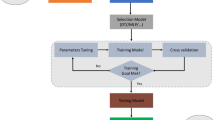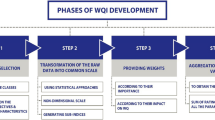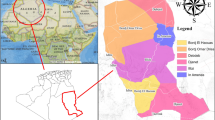Abstract
In this research a framework is developed to predict the drinking water quality through the neural network models. A fuzzy rule-based system and similarity measure algorithm yield a water quality index for different sampling locations in a water distribution network (WDN), and a neural network is trained using the quality indices. Different sources of uncertainty exist in this model, including deficient, missing, and noisy data, conflicting water quality parameters and subjective information. Hourly and monthly data from Quebec City WDN are used to illustrate the performance of the proposed neuro-fuzzy model. Also, historical data from 52 sampling locations of Quebec City network is utilized to develop the rule-based model in order to train the neural network. Water quality is evaluated by categorizing quality parameters in two groups including microbial and physicochemical. Two sets of rules are defined using expert knowledge to assign water quality grades to each sampling location in the WDN. The fuzzy inference system outputs are deffuzzified using a similarity measure algorithm in this approach. The fuzzy inference system acts as a decision making agent. A utility function provides microbial and physicochemical water quality indices. Final results are used to train the neural network. In the proposed framework, microbial and physicochemical quality of water are predicted individually.



Similar content being viewed by others
References
Aghaarabi E, Aminravan F, Sadiq R, Hoorfar M, Najjaran H (2014) Comparative study of fuzzy evidential reasoning and fuzzy rule-based approaches. Stoch Environ Res Risk Assess 28:655–679
Aminravan F, Sadiq R, Hoorfar M, Rodriguez MJ, Francisque A, Najjaran H (2011) Evidential reasoning using extended fuzzy Dempster-Shafer theory for handling various facets of information deficiency. Int J Intell Syst 26:731–758
Bazartseren B, Hildebrandt G, Holz K-P (2003) Short-term water level prediction using neural networks and neuro-fuzzy approach. Neurocomputing 55(3–4):439–450
Chen SH (1999) Similarity of generalized fuzzy number with graded mean integration representation. Eights Int Fuzzy Syst Assoc World Congr 2:899–902
Chen SJ, Chen SM (2003) Fuzzy risk analysis based on similarity measures of generalized fuzzy numbers. IEEE Trans Fuzzy Syst 11:45–56
Chen ALP, Chiu J, Tseng F (1996) Evaluating aggregate operations over imprecise data. Knowl Data Eng, IEEE Trans 8(2):273–284
Deng Y, Sadiq R, Jiang W, Tesfamariam S (2011) Risk analysis in a linguistic environment: a fuzzy evidential reasoning-based approach. Expert Syst Appl 38(12):15438–15446
Francisque A, Rodriguez MJ, Sadiq R, Miranda L, Proulx F (2009) Prioritizing monitoring locations in a water distribution network: a fuzzy risk approach. J Water Supply 58(7):488
Gardner M, Dorling S (1998) Artificial neural networks (the multilayer perceptron)—a review of applications in the atmospheric sciences. Atmos Environ 32(14–15):2627–2636
Gharibi H et al (2012) Development of a dairy cattle drinking water quality index (DCWQI) based on fuzzy inference systems. Ecol Indic 20:228–237
Lee HS (2002) Optimal consensus of fuzzy opinions under group decision making environment. Fuzzy Sets Syst 132(3):303–315
Melek W, Sadeghian A, Najjaran H, Hoorfar M (2005) A neurofuzzy-based expert system for disease diagnosis. IEEE Int Conf Syst Man Cybern 4(1):3736–3741
Sadiq R, Rodriguez MJ (2005) Interpreting drinking water quality in the distribution system using Dempster-Shafer theory of evidence. Chemosphere 59(2):177–188
Yang J, Xu D (2002) On the evidential reasoning algorithm for multiple attribute decision analysis under uncertainty. Syst Man Cybern Part A 32(3):289–304
Yildirim Y, Bayramoglu M (2006) Adaptive neuro-fuzzy based modelling for prediction of air pollution daily levels in city of Zonguldak. Chemosphere 63(9):1575–1582
Yong D, Wenkang S, Feng D, Qi L (2004) A new similarity measure of generalized fuzzy numbers and its application to pattern recognition. Pattern Recogn Lett 25(8):875–883
Zadeh LA (1965) Fuzzy sets. Inf Control 8(3):338–353
Zadeh LA (1978) Fuzzy sets as a basis for a theory of possibility. Fuzzy Sets Syst 1:3–28.
Author information
Authors and Affiliations
Corresponding author
Appendix 1: Microbial and physicochemical quality indices
Appendix 1: Microbial and physicochemical quality indices
Tables 4 and 5 present microbial and physicochemical quality indices and similarity degree of activated clusters from fuzzy rule based system in Quebec City water distribution network proposed in this study.
Rights and permissions
About this article
Cite this article
Aghaarabi, E., Aminravan, F., Sadiq, R. et al. Application of neuro-fuzzy based expert system in water quality assessment. Int J Syst Assur Eng Manag 8 (Suppl 4), 2137–2145 (2017). https://doi.org/10.1007/s13198-014-0315-5
Received:
Published:
Issue Date:
DOI: https://doi.org/10.1007/s13198-014-0315-5




